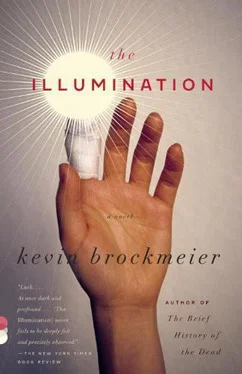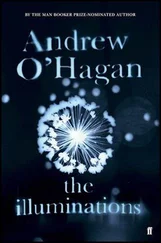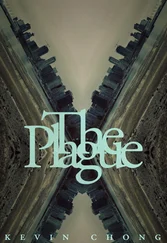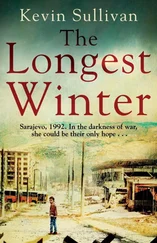He left the hospital with seven scars decorating his body. To his fingers they felt like segments of fishing wire, taut little lines threaded just below his skin, except for the cut the doctors had made to his peritoneum, which had swollen with infection while he was in recovery and now rose rippling from his stomach like a fat red hairless caterpillar. He was still in pain, still recuperating. An aurora flickered through his gut every time he stretched or coughed, sneezed or bent over. Someone had stolen his shopping cart and blanket from the alley, dumping his books into the alcove behind New Fun Ree, and he sorted through them, throwing out the ones that were rat-gnawed or waterlogged, glued shut by grease or mildew. He bought another blanket from Goodwill, stole another shopping cart from Costco, and four years after the Illumination, that day when something struck a switch in his injuries, he was still sitting cross-legged by the subway entrance, selling books to pedestrians.
“One for two or cash money. One for two or cash money.”
He was only nine years old the summer he learned that he could speak more easily when he had practiced what he was going to say. His parents had enrolled him in a workshop at the children’s theater. His teachers tried to lure him into their acting-is-believing games, but he was terrified, and nothing worked, until the hairy one, whose clothes gave off the musky smell of tennis balls in a freshly opened canister, took a gamble and cast him as Owl in The House at Pooh Corner . Morse studied the script until he had his part memorized, and taking the stage on the last day of camp, he discovered he could deliver his lines with grace and authority, as if he truly were perched on his floor that had once been a wall, telling a story to Pooh and Piglet on the blusterous morning his tree blew down. He spent the next few years believing he would become a movie or TV star when he grew up. Then one of his high school teachers explained that in proper Stanislavskian acting you should live in the moment, as if you were pioneering your words the second you spoke them, and that was it, it was all over, whatever eloquence he had imagined he possessed went bursting into the sky like dandelion snow. He could live in the moment or he could speak in it. He could not do both.
“One for two or cash money. One for two or cash money.”
That was his first method—memorization. His second was replication—sorting through the expressions he heard, weighing this piece and that, until he found the right words to mimic a real conversation. He was like a cashier returning a handful of change. In his imagination, each time he spoke, a drawer slid open and a silver bell ka-chinged .
How are you doing today? “How are you?” I’m fine, and yourself? “I’m fine, I’m fine.”
Or: Our records indicate that your full name is Morse Putnam Strawbridge—is that correct? “Correct. Morse Putnam Strawbridge.”
Or: Hello, and welcome to KFC. Would you like to try our new two-piece white-meat value meal? “New two-piece white-meat value meal.”
Though the technique could be surprisingly effective, he used it sparingly, since people tended to become angry when they realized what he was doing. Usually he relied on the dozen or so stock phrases he had already learned by heart.
“One for two or cash money.”
“What have you got here, books?”
“Books. One for two or cash money.”
“Let’s see. I think I’ll take the Poggione. How much is it?”
“Price inside the cover. Cash money.”
“Here you go then.”
Here you go then , he would think. You go here then. Then here you go . And he would accept two or three dollars from their hands, scrunching the bills together and stuffing them in his pocket. Then it was, “God bless you, brother,” or, “God bless you, sister,” and on to the next prospect. The one with the army surplus backpack and the wire-rimmed glasses. The young one, the schoolkid, rehearsing a mustache on his upper lip. The one with the in-town shoes and the out-of-town boyfriend, hoping to impress him with her daring and generosity by buying a book from the scruffy guy with the dirt browning his face. Never the one shifting her child protectively to her outside arm. Never the one discussing the stock market on his cell phone. The Readers and the Good Samaritans—that was who he wanted. He could identify the Good Samaritans from half a block away, zeroing in on him in a fury of benevolence, their fingers sharp and rigid, but the Readers were harder to spot. They could be young or old, sickly or robust, attractive or disagreeable. They inspected the books on his blanket as if they were meeting his eyes. Sometimes they would reach for one with a tiny bated coo of recognition, and he would think they were going to buy it, but no, they had already read it, and they only wanted to know if he had liked it as much as they did. They cherished certain books and disdained others with a zeal that seemed totally genuine yet totally arbitrary. Frequently they wore too much clothing. They rarely haggled. The one feature they seemed to share in common was a tightness at the nape of the neck, as if someone had fixed a stiff metal lozenge where their spine emerged from their shoulders. Though Morse himself was not a Reader, he had been studying them for years, alert for that compressed diamond of tension and the light it cast over their collars.
Sometimes, on the gray-soaked days of February and March, when the sun seemed to dissolve into the clouds like an antacid tablet, he would peer down the street and see nothing but a gleaming field of injuries, as if the traumas and diseases from which people suffered had become so powerful, so hardy, that they no longer needed their bodies to survive. From the doors of shops and art galleries came strange floating candles of heart pain and arthritis. Stray muscle cramps spilled across the sidewalk like sparks scattering from a bonfire. Neural diseases fluttered in the air like leaves falling through a shaft of light. A great fanning network of leukemia rose out of a taxi and drifted incandescently into an office building, and he watched as it vanished into the bricks, a shining angel of cancer. On sunny days, like today, the light was still visible, but Morse had to look more closely to make it out. It was people—they were the problem. Their bodies got in the way. A team of Mormon missionaries walked by in their shirts and ties. It was only after examining them carefully that he noticed that the heavy one, the one with the lumbering gait, had a crescent of athlete’s foot glowing from the heel of his shoe. The Chinese family who operated New Fun Ree wheeled their baby into the restaurant, her colic the same silvery white as her jumper. A young couple emerged from the subway, stroking each other’s hands. They turned toward the street, and their outlines blurred like plucked wires. The one with the poison ivy rash was named Adam. Just that morning he had stepped into the shower and found an awful prickling Nike swoosh of blisters crimsoning his calf. “I’ll be damned,” he said, poking his head past the curtain. “Hey, honey? Did you take me hiking or something this weekend and forget to tell me about it?” In the mirror, Helen had cocked an eyebrow, spitting her toothpaste out. “I don’t think so. Did you go away and miss me when I wasn’t looking?” She was always doing this—amazing him by drawing up some half-forgotten endearment of his, a flirty little line she had greeted with a muffled thank you months before, and offering it back to him like a petit four on a tray. She did love him. She did . He steered her past the street bum with his milk crate and his blanket. Goddamn poison ivy. Goddamn nature. If he grazed his calf with his shoe while he was walking—accidentally, let’s say—would that count as scratching? Do it, Adam. Go ahead. No one will mind. “Don’t you dare, mister,” the one in the turtleneck, Helen, warned him. “If that stuff spreads, it will be your own fault.” She took a sip of the coffee she had bought from the subway vendor, the Exotic Autumn blend. You’ll love it , he had said. Best of the season , he had said. But it had an ultrasweet botanical taste she couldn’t stand, like the dried cloves her mother always punched into the hams she prepared at Easter. Yuck. Why bother? She tossed the cup in a trash can. An alley cat leaped out from behind the pizza boxes and newspapers and sprang between her legs, bawling at her with its teeth bared, a shrill iamb of hatred. She backed away. Sometimes it seemed to her that she had no place in the world. There was no pity, no consolation. Everything she did ignited these wild billows of spite and resentment. She couldn’t even throw a cup of coffee away without causing trouble for herself. She used to be so at home in her life, so happy, and now there was Adam, only Adam, and he was too lovestruck to see her properly. How could she explain that the woman whose sweat he liked to lick off his fingers, the woman he wanted to marry, wasn’t Helen at all but the ruins of Helen, the shipwreck of Helen?
Читать дальше












